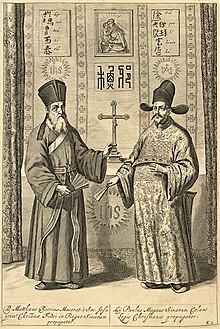
The Chinese Rites controversy (simplified Chinese: 中国礼仪之争; traditional Chinese: 中國禮儀之爭; pinyin: Zhōngguó lǐyí zhī zhēng) was a dispute among Catholic missionaries over the religiosity of Confucianism and Chinese rituals during the 17th and 18th centuries. The debate discussed whether Chinese ritual practices of ancestor veneration and other formal rites qualified as religious, and thus incompatible with Catholic belief.[1][2] The Jesuits argued that these Chinese rites were secular rituals that were compatible with Christianity, within certain limits, and should thus be tolerated. The Dominicans and Franciscans, however, disagreed and reported the issue to Rome.
Rome's Sacred Congregation for the Propagation of the Faith sided with the Dominicans in 1645 by condemning the Chinese rites based on their brief. However, the same congregation sided with the Jesuits in 1656, thereby lifting the ban.[1] It was one of the many disputes between the Jesuits and the Dominicans in China and elsewhere in Asia, including Japan[3] and India.[4] The conflict between the Jesuits and their opponents took on a historical dimension, with the former insisting that Europeans and the Chinese had a shared history, which was taken to legitimise the Jesuit "accommodation" of Chinese rites and names for the Christian God.[5]
The controversy embroiled many European universities; the Kangxi Emperor and several popes, including Clement XI and Clement XIV, considered the case; the offices of the Holy See also intervened. Near the end of the 17th century, many Dominicans and Franciscans had shifted their positions in agreeing with the Jesuits' opinion, but Rome disagreed. Clement XI banned the rites in 1704. In 1742, Benedict XIV reaffirmed the ban and forbade debate.[1]
In 1939, after two centuries, the Holy See re-assessed the issue. Pius XII issued a decree on 8 December 1939, authorizing Chinese Catholics to observe the ancestral rites and participate in Confucius-honoring ceremonies.[1] The general principle of sometimes admitting native traditions even into the liturgy of the church, provided that such traditions harmonize with the true and authentic spirit of the liturgy, was proclaimed by the Second Vatican Council (1962–65).[6]
- ^ a b c d Kuiper 2006.
- ^ Rule 2004.
- ^ Minamiki 1985, pp. 99–158.
- ^ Županov & Fabre 2018.
- ^ Giovannetti-Singh, Gianamar (March 2022). "Rethinking the Rites Controversy: Kilian Stumpf's Acta Pekinensia and the Historical Dimensions of a Religious Quarrel". Modern Intellectual History. 19 (1): 29–53. doi:10.1017/S1479244320000426. ISSN 1479-2443. S2CID 228824560.
- ^ "Sacrosanctum concilium". para. 37. Retrieved 9 February 2008.